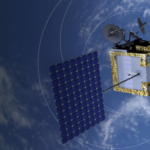DoD eyeing options to provide satcom in Ukraine as it continues talks with SpaceX

WASHINGTON — The Pentagon on Friday said it is looking at options to provide satellite communications services for Ukraine’s military forces following Elon Musk’s warning that SpaceX will suspend Starlink internet services in Ukraine unless the U.S. government agrees to foot the bill.
Deputy press secretary Sabrina Singh during a briefing at the Pentagon Oct. 14 said the Defense Department “has been in communication with SpaceX regarding Starlink” but declined to comment on the substance of the discussions.
Singh said DoD “recognizes the advantages that any satcom capability has and allows the Ukrainians to use not just on the battlefield, but within the country itself. And we understand the fragility in those communications.”
The Pentagon is “working with our partners and allies and trying to figure out what’s best,” she said. Singh declined to confirm whether the Pentagon will pay for Starlink specifically, and insisted it will examine other options.
“There are certainly other satcom capabilities that exist out there. I’m not going to show our hand right now on exactly what those are, or who we’re talking to. But we do know that there are others,” Singh said. “There’s not just SpaceX, there are other entities that we can certainly partner with when it comes to providing Ukraine what they need on the battlefield.”
“We are continuing to talk to SpaceX and other companies about satcom capabilities,” said Singh. “But I don’t want to go into further details.”
Singh declined to confirm a CNN report that Musk sent a letter to DoD saying SpaceX can no longer continue to fund the Starlink service, claiming it will cost $120 million for the rest of the year and as much as $400 million for the next 12 months.
“In addition to terminals, we have to create, launch, maintain & replenish satellites & ground stations & pay telcos for access to Internet via gateways,” Musk tweeted Oct. 14. “We’ve also had to defend against cyberattacks & jamming, which are getting harder. Burn is approaching ~$20M/month.”
SpaceX’s plea for government funding puts the Pentagon in a quandary because even though the Pentagon is sending billions of dollars worth of weapons, equipment and assistance to Ukraine, it appears that DoD never requested SpaceX to supply Starlink terminals and internet service to Ukrainian forces.
As a senior U.S. defense official told The Washington Post, SpaceX “sticks the DoD with the bill for a system no one asked for but now so many depend on.”
In reaction to critics, Musk on Oct. 15 tweeted: “The hell with it … even though Starlink is still losing money & other companies are getting billions of taxpayer $, we’ll just keep funding Ukraine govt for free.”
How it all started
In the days following Russia’s invasion of Ukraine, according to Twitter posts, Musk single handedly moved to send over satellite terminals in response to a request by Ukrainian Vice Prime Minister Mykhailo Fedorov, the country’s minister of digital transformation. Musk said Feb. 26 — two days after Russia launched the invasion — that Starlink service had been turned on in the country and, two days later, an initial shipment of at least several dozen Starlink terminals arrived in Ukraine.
Musk commented in March that SpaceX made software changes to reduce the terminal’s power consumption, allowing it to be powered by a cigarette lighter in a car, and to enable roaming on moving vehicles.
Fedorov said Starlink has become a key piece of the country’s critical infrastructure.
Singh said DoD is “trying to do what we can … to ensure that these communications remain for the Ukrainian forces … We are working with the Ukraine Ministry of Defense. We know that there is this demand and satcom capability is needed.”
A senior executive from Viasat, a communications satellite operator that provides satcom service in Ukraine, said the company is ready to step in to help fill demand.
“We have been providing broadband for humanitarian and rescue operations throughout the crisis, and stand ready to provide expanded services for the Ukraine, U.S. and our allies,” Craig Miller, Viasat’s president of government systems wrote Oct. 14 in a LinkedIn post.
The power of a private company
Amid the wrangling over who should pay for Starlink in Ukraine, questions also are being raised about the power of a private company in driving national policy.
The topic came up during a panel discussion Oct. 13 at the MilSat Symposium in Mountain View, California.
Preston Dunlap, CEO of Arkenstone Venture and a former U.S. Air Force official, pointed out the new reality that a CEO now has the power to turn off the internet in a critical part of the world. Preston was referring to reports that Musk personally declined a Ukrainian request to provide Starlink internet service in Crimea — territory Russia occupied in 2014 but continues to be claimed by Ukraine — because he thought that would result in a nuclear conflict. Political analyst Ian Bremmer from the Eurasia Group said Musk “refused given the potential for escalation.”
Dean Bellamy, executive vice president of national security space at Redwire and a retired U.S. Air Force colonel, said SpaceX’s role in Ukraine will be a case study about a commercial business “not operating under a government contract but affecting policy and making decisions that could affect the outcome of a conflict.”
-
 Commercial Launch Military
Commercial Launch MilitaryU.S. military waiting for industry to demonstrate space transportation concepts
U.S. Transportation Command is keeping an eye on space launch companies as they develop technology and mature concepts for point-to-point cargo delivery.
































No comments:
Post a Comment